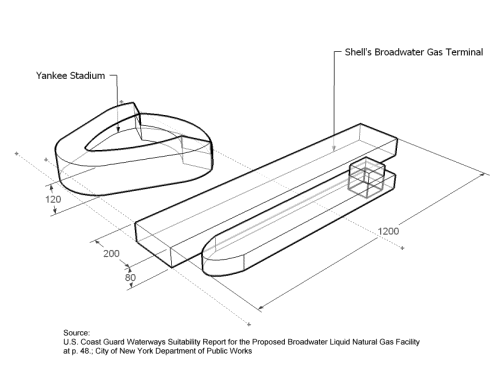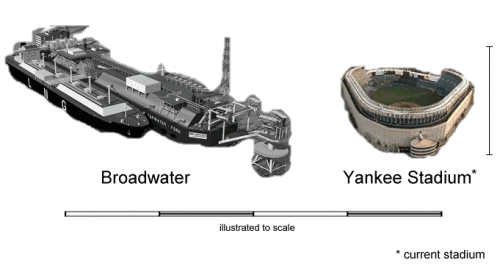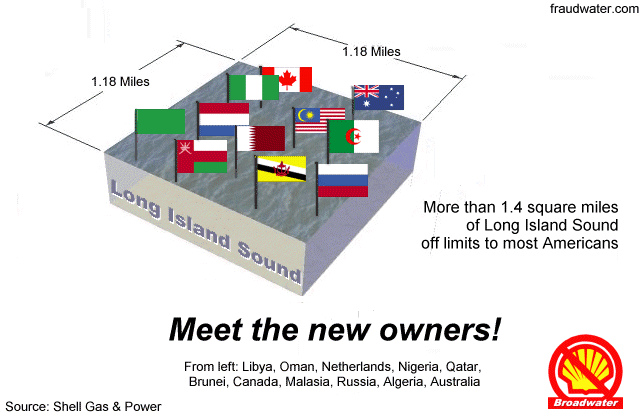Shell Broadwater: Just the Facts
Upon review of many of the statements made by proponents of the project, it is abundantly clear that an effort needs to be made to separate fact from fiction.What We've Heard: "Shell Broadwater gas would be cheap and reliable"
The FactsIf built, Shell Broadwater would sit idle just like other terminals that were built and never used. According to the Wall Street Journal, the industry made a bad call, they "blew it" by assuming U.S. natural-gas production is entering a slow, terminal decline. In fact, the opposite has happened. Rising prices and easy financing encouraged a horde of companies to develop "unconventional" gas fields such as the Barnett and Haynesville shales, located, respectively, in north Texas and along the Texas-Louisiana border. These shale wells, once thought to be too costly and difficult to exploit, succeeded beyond everyone's expectations. The federal government radically changed its forecasts. In 2006, the Energy Information Administration forecast that LNG imports would reach 6.4 trillion cubic feet in 2025. But in its Annual Energy Outlook released in December, it slashed that to 1.2 trillion cubic feet. Imported natural gas, including pipelines from Canada, made up 16% of U.S. natural-gas consumption in 2007, but is expected to drop to below 3% by 2030.
What We've Heard: "Shell Broadwater will save the average household $300 per year in energy costs."
The FactsThis statement is untrue. The region will spend more or less on natural gas and electricity costs depending on factors such as price speculation, the weather, the economy, and events in the Middle East. Experts can only guess what future gas prices will be. There is no way of knowing how much the average household will pay for energy in the future; the only thing that's certain is that gas prices will continue to rise.

What We've Heard: "Shell Broadwater is the only source of new gas."
The FactsThis statement is untrue. Between 168 and 516 trillion cubic feet of natural gas was recently discovered in Pennsylvania just 90 miles from New York City. Why does Shell want to build Broadwater when a thousand times more gas is right next door? We're not making this up. Here's another article from the Wall Street Journal.
What We've Heard: "Shell Broadwater gas is a non-polluting alternative to coal."
The FactsBurning natural gas isn't healthy. Gas from Shell Broadwater is bad for Asthma and particulate emissions from the combustion of natural gas is of concern with respect to the emission of fine particulate matter, especially in neighborhoods that have been shown to be at or above federal ambient standards (source: New York City Energy Task Force, Overview of Energy Supply Infrastructure).
What We've Heard: "Mayor Bloomberg is a green mayor"
The FactsMayor Bloomberg is a green mayor however his environmental policies are a basket of contradictions. The mayor's vigorous sponsorship of environmental initiatives contrasts sharply with his quiet, behind the scenes backing of Shell Broadwater.
Shell Broadwater trades (uncertain) cost & convenience for environmental harm. It's an embarrassing contradiction which helps explain why the mayor is absent in the Shell Broadwater debate.
What We've Heard: "If Shell Broadwater isn't built we will be out in the cold"
The FactsShell Broadwater has failed to identify any compelling need for the new natural gas supply and several alternatives that would better serve the region exist, including two regional natural gas projects that have already received regulatory approval. If Shell Broadwater isn't built, Long Island, New York City and southern Connecticut will continue to enjoy reliable domestic natural gas from North America instead of gas from unstable and sometimes unfriendly foreign countries. In addition, if Shell Broadwater isn't built, Shell will not receive more than $2.5 billion in profit.
What We've Heard: "Shell Broadwater wont cause a dandelion effect of similar projects in Long Island Sound"
The FactsShell Broadwater clears the way for other industrial projects in Long Island Sound. They are establishing a legal precedent and clearing away regulatory roadblocks and making it much easier for more companies to take over Long Island Sound. After Shell Broadwater is built other industrial projects will spread like weeds.

What We've Heard: "Shell Broadwater wont cause a domino effect of similar projects around the country"
The FactsShell Broadwater clears the way for other industrial projects across the US. Shell is establishing legal precedents and clearing away regulatory roadblocks and making it much easier for more companies to take over inland waterways. After Shell Broadwater sensible safeguards will fall like dominos.

What We've Heard: "The choice is between Shell Broadwater or coal."
The FactsThe choice is between existing natural gas from North America or imported Shell Broadwater gas from unstable and often unfriendly countries.
What We've Heard: "Shell Broadwater is a crazy idea and will never get approved."
The FactsShell Broadwater is being guided through the approval process by people such as Rudy Giuliani. Eliot Spitzer's troubles are a great distraction and make it even more likely the project will sneak through. Click here to find out what you can do.
What We've Heard: "Relocating Shell Broadwater in the Atlantic isn't feasible."
The FactsShell isn't comfortable with alternatives being proposed by competitors like Exxon. It's cheaper for Shell to put a terminal in Long Island Sound than in the Atlantic.
What We've Heard: "Shell Broadwater gas will be used to heat homes."
The FactsThe largest portion of the gas will be used to generate extra electricity (source: Mayor Bloomberg's New York City Energy Policy Task Force, 2006). It will be used to air condition unnecessary new power-hungry developments like Donald Trump's 56 acre mini-city on Manhattan's west side (see photo).


What We've Heard: "The Sound has been "industrialized" for quite some time"
The FactsThis statement is untrue. There's a world of difference between delivering concrete, lumber, steel and fruit to Bridgeport and building a large scale industrial complex in the middle of the Long Island Sound estuary. There are currently no gas supply and storage facilities in the middle of Long Island Sound; Shell Broadwater would be the first and it would be massive (8 billion cubic feet of storage). There's a coal plant in Bridgeport but that doesn't make Shell Broadwater a good project. In fact, it's an example of the "they did it, so we should be allowed to do it too" point of view that will turn Long Island Sound into a mess.
What We've Heard: "Rudy Giuliani's, consulting company may get an anti-terrorism contract from Shell Broadwater if it is approved."
The FactsRudy Giuliani already has the contract. Giuliani Group LLC and a company headed by retired Brigadier General Kenneth P. Bergquist have been retained by TransCanada Corporation (TransCanada) and Shell US Gas & Power Company (Shell) to provide security and strategic consulting services for Broadwater. If this project is so safe, what's the Brigadier General for?
What We've Heard: "Broadwater technology is safe."
The FactsThis statement is untrue. LNG terminals are so scary there's actually a law preventing new ones from being sited near populations of 1 million or more. Terrorism is such a possibility that Shell hired a company headed by a retired brigadier general to hopefully protect it. Somewhere in the world one commercial ship a day is lost. Marine transport is an error-inducing system, where interconnections often defeat safety goals as well as operating efficiencies.
What We've Heard: "Broadwater will be located too far away to see from shore"
The FactsThis statement is untrue. The Broadwater processing facility will be clearly visible more than twenty miles away and even further on a clear day. Broadwater's bright industrial lights will look like a city at night.
What We've Heard: "Oil companies are often given sections of the open water body."
The FactsThis statement is untrue.There are currently no gas supply and storage facilities in the middle of Long Island Sound; Broadwater would be the first and it will set off a "land and water grab".
What We've Heard: "There isn't a ban on LNG facilities in New York City"
The FactsThere is a ban on LNG facilities in New York City and the ban should be extended to Long Island Sound.
What We've Heard: "Broadwater isn't big."
The FactsShell Broadwater is bigger than Yankee Stadium:


What We've Heard: "Discharges from the Broadwater facility won't raise temperatures in Long Island Sound "
The FactsThermal discharge associated with the Broadwater facility will come from LNG carriers while they are moored at the facility.
What We've Heard: "Shell Broadwater is good for America."
The FactsMore than 1.4 square miles of Long Island Sound will be off limits to most Americans:

What We've Heard: "Broadwater won't affect Long Island's commercial fishing industry."
The FactsIf fishing is affected, Shell will share a portion of their profits with the local commercial fishing industry based on any demonstrated loss of fishing, as well as any gear damage.
What We've Heard: "Broadwater wont be a visual blight and wont light up the night sky."
The FactsLocating a massive industrial plant in the middle of Long Island Sound doesn't make it smaller. Based on Broadwater's own data, it will be visible for more than twenty miles.
What We've Heard: "Broadwater wont require any dredging or new pipelines"
The FactsBroadwater will require a new pipeline located in some of the deepest sections of the Sound. It will damage the sea floor and take years to recover.
